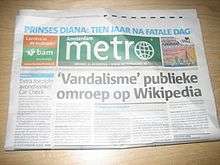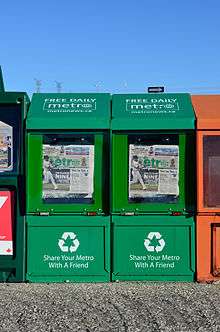Metro International
 | |
| Public (Nasdaq Stockholm: MTROA, (Nasdaq Stockholm: MTROB) | |
| Founded | 1995 |
| Headquarters | Luxembourg |
| Website | www.metro.lu |
Metro International is a Swedish media company based in Luxembourg that publishes the Metro newspapers. Metro International's advertising sales have grown at a compound annual growth rate of 41 percent since launch of the first newspaper edition in 1995.[1] It is a freesheet, meaning that distribution is free, with revenues thus generated entirely through advertising. This newspaper is primarily intended for commuters who move daily in and out of big cities' business areas, mainly during rush hours.
The company was founded by Per Andersson and started as a subsidiary of the Modern Times Group along with Viasat Broadcasting. It is now controlled through investment company Kinnevik. The first edition of the newspaper was published as Metro Stockholm and distributed in the Stockholm metro. As of 2012, all European editions (except for the Hungarian one) have been sold, reportedly so that Metro International can focus on Latin America, considered the last growth market for free newspapers.[2][3]
Metro newspapers

As of October 2009, there were 56 daily editions in 15 languages and in 19 countries across Europe, North and South America, and Asia, for an audience of more than 17 million daily readers and 37 million weekly readers.[1]
Metro newspaper editions are distributed in high-traffic commuter zones or in public transport networks, via a combination of self-service racks and by hand distributors on weekdays. Saturday editions are published in Stockholm, Santiago, São Paulo, and Lima. The distribution points are located either in or around public transport networks (subways, trains, buses, trams), office buildings, retail outlets, at key distribution points on busy streets, or in other high-density population areas such as college campuses.
Metro International launched several editions in Canada during 2000, leading to the creation of several commuter newspaper competitors, such as Sun Media's 24 Hours.
The local name of the Metro newspaper editions may vary due to trademark issues. Peruvian, Chilean, and Mexican editions are called Publimetro, and the Spanish edition is named Metro Directo.
Not all newspapers named Metro are part of the Metro International group. Associated Newspapers publishes another freesheet called Metro in twelve areas around Britain. This UK Metro is not related to Metro International, which used the name Morning News for its (now defunct) freesheet distributed there. However, Metro International and Associated Metro do collaborate on the Dublin Metro Herald newspaper (launched 10 October 2005), which they both own a third of, along with The Irish Times. The Dublin Metro newspaper uses the Associated Metro logo and format, however.[4] It is reported that Metro International has plans to launch a rival free evening newspaper in London.
There are also other examples of newspapers named Metro that are not part of the Metro International Group. In Belgium, Mass Transit Media, a joint venture of Concentra and Rossel, publishes the free daily newspaper Metro. In California, Metro Silicon Valley is a free weekly newspaper which was founded in 1985. Neither of these newspapers have links to Metro International.
Timeline of Metro editions
- Metro was first launched in Stockholm on 13 February 1995.
- A German-language edition is published in Switzerland by Metro Publication (Schweiz) AG under the name Metropol on 31 January 2000 as a direct competitor to 20 Minuten. The newspaper ceased publication without announcement on 13 February 2002.
- In 2000, a Spanish edition named Publimetro is published in Buenos Aires, Argentina, with a circulation of 390,000.[5] Facing competition from the free daily La Razón published by Grupo Clarín, Publimetro is suspended indefinitely a year later.[6]
- A weekly magazine named Metropop starts publication in Hong Kong on 27 April 2006 (published on Thursdays).
- At the end of 2006, Metro started a dedicated technology paper, Metro Teknik (English section)[7] which is distributed weekly to companies, science parks, and technical universities around Sweden.
- Due to financial difficulties in the press sector in general, and the free press in particular, Metro International closed down its Polish edition on 5 January 2007. Earlier, the Danish afternoon version of the newspaper was closed down, and the business in Finland was sold.
- As of October 2008, the Croatian Metro edition was also cancelled, due to disappointing advertorial income.
- As of 29 January 2009, Metro International closed down its Spanish operations.
- In 2009, Metro sold its US papers.[8]
- As of 31 May 2012, Metro International was delisted from the NASDAQ OMX Stockholm stock exchange.[9]
Metro editions by region
Europe
In addition to having national editions in Czech Republic, Denmark, Greece, Hungary, Italy, Finland, France, the Netherlands, Portugal, Russia, and Sweden (Metro), city editions of Metro are published in many major cities.
Note: Belgium has a bilingual free newspaper with the same name, but it is not owned by Metro International.
North America

- Canada: Metro's Canadian newspapers were launched in 2000 and were originally published by joint ventures with Canadian companies to comply with Canadian media laws. The 2000 launch of Metro in Toronto sparked a newspaper war as the daily Toronto Star and Toronto Sun both scrambled to put out their own free giveaway versions aimed at commuters. The Toronto edition of Metro merged with its Torstar rival GTA Today in 2001.[10] Metro International sold 40 percent of its 50 percent share in most of the English-Canadian papers to Torstar Corporation[11] though they retain the Metro masthead and layout.
- Mexico: Metro is published in Guadalajara, Mexico City, and Monterrey
- United States: Metro is published in Boston, New York City (Metro New York), Philadelphia (Philadelphia Metro) and Puerto Rico (See Caribbean, below.)
South America and Caribbean
- Brazil: Metro is published in major metropolitan regions such as Belo Horizonte, Brasília, Porto Alegre, Rio de Janeiro, Campinas, Baixada Santista, and São Paulo.
- Chile: Metro is published in major conurbations such as Concepción, Rancagua, Santiago, Talcahuano, and Valparaíso
- Colombia: Metro is published in Bogota
- Ecuador: Metro is published in Guayaquil, Quito and Cuenca
- Peru: Metro is published in Lima
- Guatemala: Metro is published in Guatemala City
- Nicaragua: Metro is published in Managua
- Puerto Rico: Metro is published in Puerto Rico
Asia
- Hong Kong: This edition is known as Metropolis Daily in English
- Republic of Korea (South Korea): Metro is published in Busan and Seoul
See also
References
- 1 2 http://hugin.info/132142/R/1125327/208539.pdf
- ↑ Sabel, Pieter (29 August 2012). "Wat moet TMG met gratis dagblad Metro?". de Volkskrant. Retrieved 29 August 2012.
- ↑ "Telegraaf koopt gratis dagblad Metro". de Volkskrant. 29 August 2012. Retrieved 29 August 2012.
- ↑ Byrne, Ciar (3 April 2003). "Desmond in Swedish talks over London freesheet". The Guardian.
- ↑ Hora De Cierre – The Official Publication of the IAPA's Press Institute
- ↑ Newspaperinnovation.com
- ↑ Metro.se
- ↑ Metro International Sells U.S. Business to Former CEO Toernberg
- ↑ "Metro delisted 31 May 2012". Metro International. 3 May 2012.
- ↑ "GTA Today, Metro will merge next week".
- ↑ Metro International Annual Report 2011, p. 6, 35 http://www.metro.lu/files/2011%20Annual%20Report.pdf
External links
![]() Media related to Metro (newspaper) at Wikimedia Commons
Media related to Metro (newspaper) at Wikimedia Commons